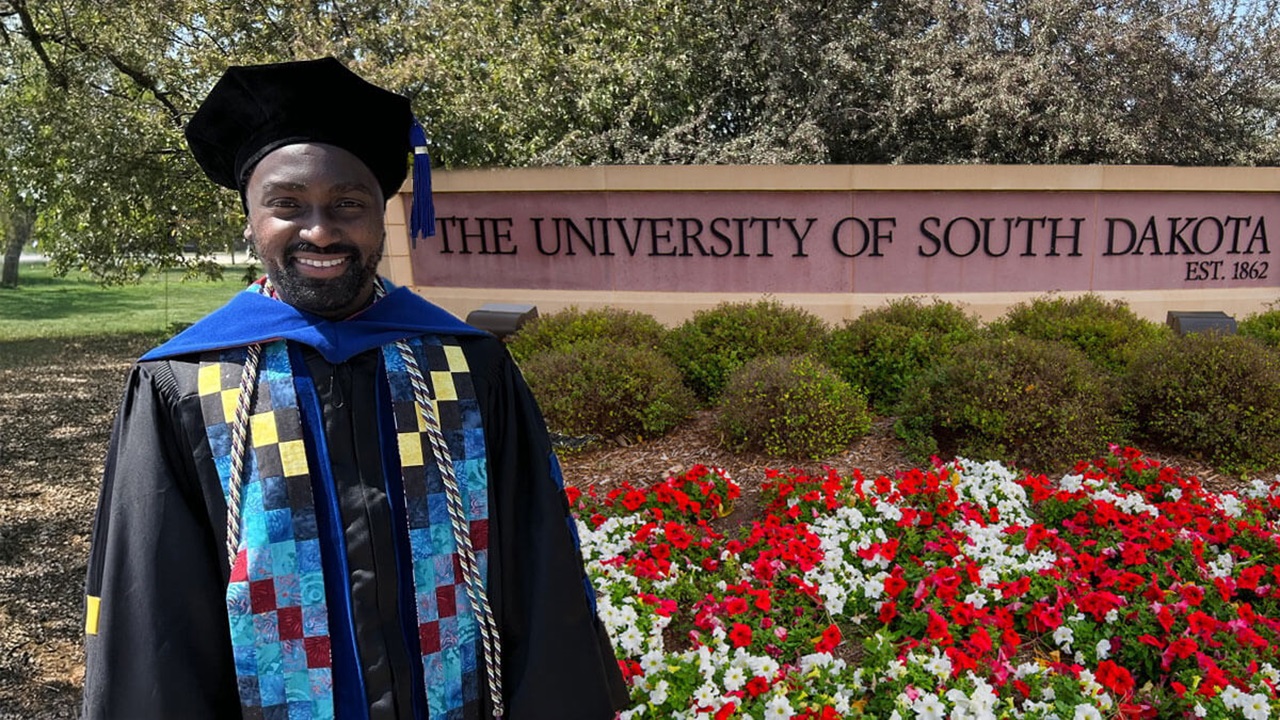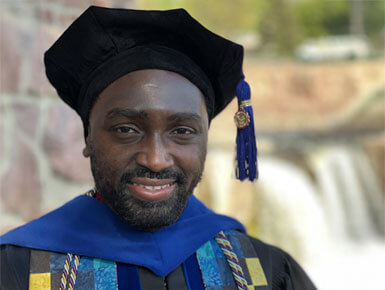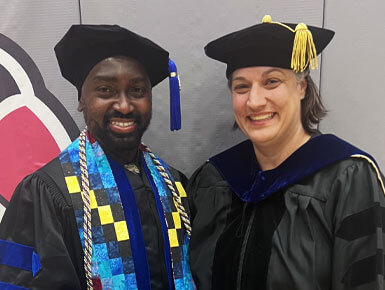USD's McHale Davis Makes History as Moore's Island's First Doctoral Graduate

Davis is the first person from Moore’s Island to earn a doctoral degree – a milestone he hopes will inspire others from his community to pursue their own educational goals.
“This accomplishment means carrying the hopes and dreams of a resilient community that has long faced economic hardship and limited educational access. It symbolizes what is possible for future generations of Moore’s Islanders who may feel defined by their geographic isolation or social circumstances,” said Davis. “It is a tribute to the teachers, family and community members who believed in me, even when resources were scarce. Earning this degree is my way of honoring their sacrifices and showing young people from Moore’s Island that they can break barriers and achieve greatness, no matter how small their beginnings.”
Driven by community support and a vision for the future, Davis’s educational journey began at 13, when he left his family to live on the mainland of Abaco and complete high school. Two years later, he graduated with honors, an achievement that became both a personal milestone and a testament to the resilience instilled in him by his upbringing.
“These formative experiences motivated me to pursue higher education and ignited a calling to return and give back to my community,” said Davis. “The guidance of my teachers helped me grow as an educator and reaffirmed the importance of nurturing the younger generation with care and sincerity.”
After pursuing a bachelor’s degree in secondary education, Davis returned to Moore’s Island and taught at Moore’s Island All Age School, where he inspired students to believe that their circumstances do not define them and that education can offer a powerful path forward.
Taking his teachings to heart, Davis sought the opportunity to further his education in the United States, earning his master’s degree in educational psychology and methodology at the University at Albany in Albany, New York. After graduation, he searched nationwide for an affordable university with a doctoral program in educational psychology that matched his professional goals.
That’s when he found USD.
“The human development and educational psychology graduate program at USD was a perfect match for my passion in helping communities address learning challenges and teaching others about developmental processes,” said Davis. “Plus, the smaller class sizes allowed for more individualized attention and deeper engagement with the material.”
At USD, Davis engaged in classes that gave him a strong foundation in statistical methods, motivational theories, teaching strategies and technology integration. These classes ultimately helped guide him to his dissertation topic on student motivation in Bahamian public schools – a topic inspired by his concern for the system’s ongoing academic challenges.
“As a former teacher within the Bahamian system, I witnessed firsthand the struggles many students faced with academic engagement and performance,” said Davis. “These realities motivated me to explore how fostering intrinsic motivation through supportive teaching behaviors could improve students’ academic outcomes and ultimately increase the graduation rate across public high schools in the Bahamas.”
Throughout his time at USD, Davis worked closely with his advisor, Gabrielle Strouse, Ph.D., associate professor in the Department of Counseling and Psychology Education and his dissertation chair.
Davis credits Strouse for her patience, encouragement and advocacy on his behalf. Strouse commends him for his hard work and keen ability to recognize what students need to feel motivated and supported in their learning.
“McHale was a teaching assistant for my statistics course and provided corrective feedback in an extremely supportive way,” said Strouse. “It helped me expand my skills in being clear and corrective, while also warm, kind and encouraging. His journey shows his dedication to supporting others in rising above inequities and economic hardship to reach successes aligned with their personal goals and values.”
Davis also applauded his dissertation committee members, Department of Counseling and Psychology in Education Professors Lisa Newland, Ph.D., and Harry Freeman, Ph.D., as well as Professor Emerita Karen Card, Ph.D., who, according to Davis, all offered thoughtful critiques and valuable insights that helped shape his work into a more rigorous and publishable study.
Likewise, Davis recognizes USD for supporting his research with the James D. Moran Memorial Grant from the School of Education to assist with his dissertation’s data collection and the Rose Grant from the Division of Counseling and Psychology in Education which – along with a grant from the National Science foundation – enabled him to attend the International Mind, Brain, and Education Society Conference.
While at USD, Davis served on the Graduate and Professional Student Association as the graduate representative for the University Assessment Committee and the Student Affairs Committee. He also worked as a research and teaching assistant in the human development and educational psychology program.
“These experiences at USD have equipped me with the knowledge and skills to fulfill my goal of supporting student learning and enabling students to reach their full potential both inside and outside of the classroom,” said Davis.
Davis hopes to bring change to public schools in the Bahamas by improving education, emphasizing the importance of motivating students from within, increasing graduation rates and promoting more equitable outcomes.
“By showing how specific teaching behaviors are linked to students’ motivation and achievement, I aim to give educators and policymakers actionable strategies to improve student engagement and performance, especially in core subjects like mathematics,” said Davis. “I also hope the findings inspire professional development programs that equip teachers with tools grounded in self-determination theory to better meet students’ psychological needs.”





